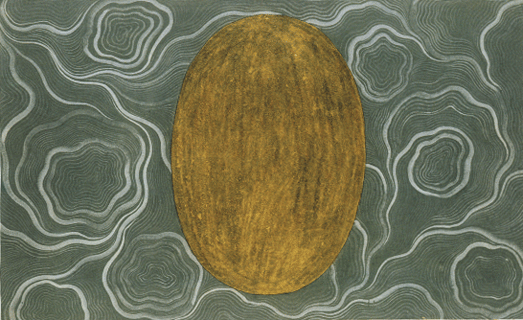
The Cosmic Egg
According to the worshipers of Visnu, the cosmic egg (also known as the golden womb) emerges from the world ocean at the beginning of the ever-recurring cycle of creation as a result of the friction produced by wind and water. Visnu then enters the cosmic egg and, after a period of quiescence, the creator of the god Brahma is born from his navel. With this, the creation of the manifest universe begins.
Source: ARAS
The world egg, cosmic egg or mundane egg is a mythological motif found in the creation myths of many cultures and civilizations. Typically, the world egg is a beginning of some sort, and the universe or some primordial being comes into existence by “hatching” from the egg, sometimes lain on the primordial waters of the Earth.
Vedic mythology
This is one of many material universes, Brahmandas, which expand from Mahavishnu when He breathes. One of the earliest ideas of “egg-shaped cosmos” comes from some of the Sanskrit scriptures. The Sanskrit term for it is Brahmanda (ब्रह्माण्ड) which is derived from two words- ‘Brahm’ (ब्रह्म) means ‘cosmos’ or ‘expanding’ and ‘anda’ (अण्ड) means ‘egg’. Certain Puranas such as the Brahmanda Purana speak of this in detail.
The Rig Veda (RV 10.121) uses a similar name for the source of the universe: Hiranyagarbha (हिरण्यगर्भ) which literally means “golden fetus” or “golden womb”. The Upanishads elaborate that the Hiranyagarbha floated around in emptiness for a while, and then broke into two halves which formed Dyaus (Heaven) and Prithvi (Earth). The Rig Veda has a similar coded description of the division of the universe in its early stages.
Greek mythology
The Orphic Egg in the Ancient Greek Orphic tradition is the cosmic egg from which hatched the primordial hermaphroditic deity Phanes/Protogonus (variously equated also with Zeus, Pan, Metis, Eros, Erikepaios and Bromius) who in turn created the other gods. The egg is often depicted with a serpent wound around it.
Many threads of earlier myths are apparent in the new tradition. Phanes was believed to have been hatched from the World-Egg of Chronos (Time) and Ananke (Necessity). His older wife Nyx (Night) called him Protogenus. As she created nighttime, he created daytime. He also created the method of creation by mingling. He was made the ruler of the deities and passed the sceptre to Nyx. This new Orphic tradition states that Nyx later gave the sceptre to her son Uranos before it passed to Cronus and then to Zeus, who retained it.
Egyptian mythology
In the original myth concerning the Ogdoad, the world arose from the waters as a mound of dirt, which was deified as Hathor. Ra was contained within an egg laid upon this mound by a celestial bird. In the earliest version of this myth, the bird is a goose (it is not explained where the goose originates). However, after the rise of the cult of Thoth, the egg was said to have been a gift from Thoth and laid by an ibis, the bird with which he was associated.


Oh cosmic egg progenitor of all, your eternal roundness speaks of the round thing, the oneness of the universe. Endless light wraps you curves. Whiteness – Darkness When your shadow eclipses worlds we shudder, gather in community and sing incantations of redemptive love. OM
When you are opened the great flame rises to the endless heavens freeing the tongues of prophetic fire to speak!
I have noticed that the Cosmic Egg is sometimes associated with the masculine pronoun rather than the feminine one. It is a bit jarring, considering that the creation, production and/or reproduction of life being brought forth from eggs lies within the feminine domain.